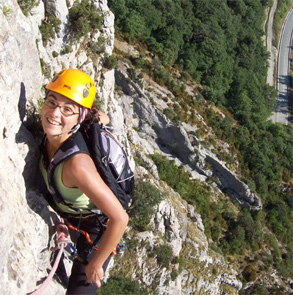Eider Elizegi, doctora en Biología por la Universidad de Navarra, obtiene un premio literario con su novela 'Mi montaña'
Eider Elizegi, PhD in Biology from the University of Navarra, obtains a literary award with her novel 'Mi montaña'.
The work narrates his four-month experience in the Goûter hut on Mont Blanc at an altitude of almost 4,000 meters.

It is not a usual case, but Eider Elizegi felt so linked to the environment and nature that she left everything (work, apartment, etc.) to live her passion in first person: the mountains. After completing in 2003 the doctorate in the department of Histology and Pathology Anatomy , under the direction of Luis Montuenga, and that took by degree scroll "Expression and biological activity of peptides derived from proadrenomedullin in lung tumors. New neuroendocrine markers", Elizegi has already climbed several peaks in the Pyrenees, Alps and even the Peruvian and Bolivian Andes, living personal experiences that have been enough to launch him into the world publishing house and publish his novel'Mi Montaña', with which he won the 'award Desnivel de Literatura, Montaña, Viajes y Aventura 2010'.
His passion for the mountains came late, coincidentally while preparing his thesis doctoral School of Sciences at the University of Navarra. "At the time when I was doing the thesis I discovered that I liked running and I started to participate in long-distance races. And practically at the same time I started climbing mountains in the Pyrenees, I took a winter mountaineering course and my brother taught me how to rock climb. But thesis and research were so absorbing that they left me no room to develop these other interests, such as the mountain and literature. That's why, when I finished it, I left this field aside," he says.
The topic of his thesis doctoral thesis and the mountain are not related, but Elizegi does see a point in common. "The thesis was such a strenuous work that it allowed me to learn a lot about myself: how to withstand stressful situations, how to work in a team, how to solve problems that are impossible to solve... and I think that all that experience is useful to me now when I practice mountaineering and, at least sometimes, the mountain puts me in complicated situations," she stresses.
In addition, she considers that her status staff , for which she had to face the university programs of study thanks to the scholarships, was good for her to adapt to more complicated situations: "I was able to finish degree program and thesis thanks to the scholarships partnership and research that they gave me. I lived with very little money, and that helped me learn to get by with the minimum, to be very austere and not to spend any money. Now that I'm a vagamontañas and live in a van, that learning comes in handy. Needing few things and little money to live financial aid me to be more free".
Future linked to literature?
Her love for telling her experiences began with the blog'vagamontanyas.blogspot.com'. But he has also decided to tell his experience in a book, 'Mi Montaña', which narrates the four months that Elizegi lived in the refuge of Goûter, at 3,817 meters above sea level, on the highest mountain in Europe, Mont Blanc.
According to Edurne Pasabán, member of the jury of the award he has obtained, "it is not a story of great mountains or great adventures, it is an intimate and close adventure", with which Elizegi tries to make readers feel identified. In the words of the book's publishing house "that is one of the great contributions of this novel, its enormous empathy, the simple ease with which it introduces us to the everyday to get from there to the transcendent".
Looking to the future, Elizegi already has in hand "several literary projects that I want to try to publish. I am also working on other ideas with my sister and brother-in-law, who are illustrators and graphic designers. I would very much like these works to see the light of day", she confirms.
In any case, she does not hesitate in wanting to continue living "very close to the Earth, to eliminate at least a part of the superfluous needs that this society imposes on us, to value the little things that we have forgotten to value (like the water we drink or with which we wash ourselves, the food we eat, the heat that sweetens us or the cold that numbs us, the air we can breathe...) and to live a simple life....) and lead a simple and mineral life very close to the Earth, to the changes in the weather, to the grass, the rocks and the mountains...", he concludes.
